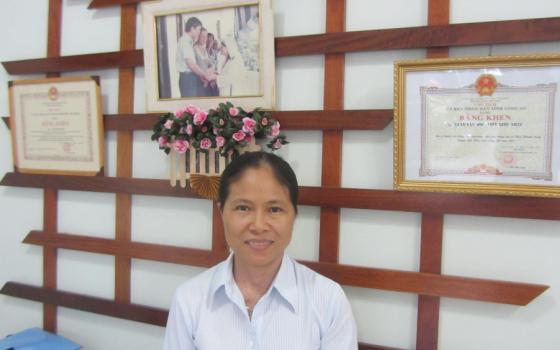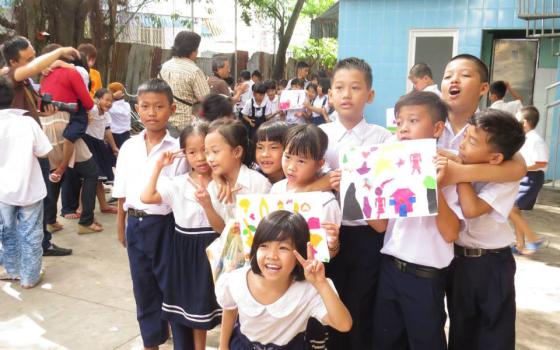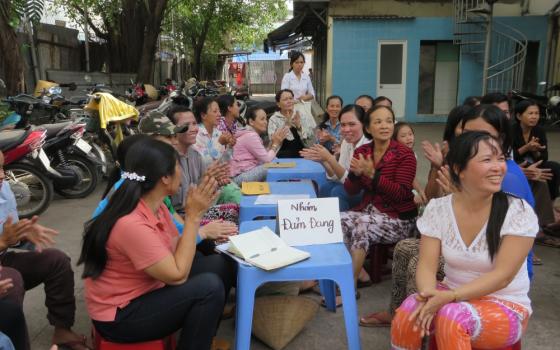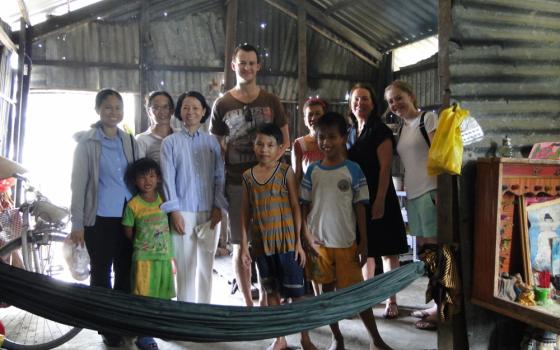The Friends For Street Children Association (FFSC), founded by Vietnamese-Japanese Catholic Thomas Tran Van Soi in 1984 in Ho Chi Minh City, allows homeless and disadvantaged children to have access to education, helping to integrate them into society.
The association now offers free basic education, scholarships, health care, living skills, moral values and vocational training to over 1,000 orphans and children from poor families. Their parents are also given services to improve their living conditions and ensure the safety and well-being of their children.
Vietnam's state statistics report there are 1.75 million children who have to work at a young age. Fifty-five percent of them drop out of school to work, and 32 percent work at least six hours per day.
Dominican Sr. Mary Le Thi Thao started to work for FFSC in 1998 before studying in the Philippines, where she earned a master's degree in social work. After returning home, she became FFSC's executive director in 2005.
GSR: Please tell me some of your activities.
Sr. Mary Le Thi Thao: We are now working with over 1,100 poor children and their families at seven development centers and one handicraft workshop. Most of the children are from domestic migrant workers throughout the country. Those families live in poverty, do manual work for a daily living and have no personal papers.
Some 650 children attend classes at three centers, ranging from first through fifth grade. Those who finish fifth-grade classes will enter public secondary schools.
We award 350 students scholarships given by benefactors from Australia, Canada, France, Japan, the U.S. and Vietnam. Each student gets $30 a month. They are also given moral values, human dignity, living skills and health care. Some 100 students learn English and Japanese at evening classes.
After classes, children have to do various work — selling lottery tickets, catching fish in streams and working at markets at night — to support their families. They could not attend classes held in the evening by government authorities.
The government recognizes our work and gives legal documents to the children so that they can enter public schools.
We have a handicraft workshop where women produce handbags, billfolds, purses and other things for a living.
And 45 staff members, including 10 sisters, serve the children.
How do you work with their families?
We design savings and credit programs that provide money for 150 parents to do small business, repair houses, and buy motorbikes to carry passengers for a living. In doing so, they avoid having their children drop out of school to support their families.
Some parents have poor education, live in poverty, struggle for daily basic needs and do not care about educating their children. They often move to other places to find jobs. Children who are old enough drop out of school and work.
We educate people on the importance of children's education. We teach them how to look after their children, give first aid, keep personal and food hygiene, and deal with family problems, too.
They attend regularly meetings and cooking contests to build community solidarity among them, as they have few relatives in the city.
What are purposes of FFSC?
We find that education is the key to changing the lives of disadvantaged children, so we allow them to have access to education and health care and empower them to make their own life decisions in the future.
We look for kids on the streets and encourage their parents to allow them to go to school. They are given material support and scholarships to further their studies. After school, they learn vocational skills and have jobs and then live a normal life.
Many suddenly stop going to school. We examine their situations and see how to work with them. In many cases, we offer them food, bicycles, travel expenses and even pay their rent so that they can continue their studies.
It is important to accompany them during their study periods. If not, they will return to their old habits and be caught in a vicious circle — poverty, illiteracy and indignity — like their families.
Finally, we welcome college students who study social work to our centers and share our practical experience with them.
How do the children respond to your services?
I am happy that they are aware of their dignity and personal responsibility. Many used to live at garbage dumps and were used to strewing rubbish around everywhere, and it takes them three or four years to develop a good habit of putting garbage into waste bins.
Gradually, they also give up their aggressiveness, violence and selfishness. At the same time, they learn how to take part in community activities, support one another and show solidarity with others.
One time, our children were invited to attend a birthday party of a kid from a wealthy family at a large restaurant. After the children played games and had a lot of fun, they were given some money to leave the party because it was so crowded.
'Do you feel sad about not attending the party?' I asked them, and they answered, 'No. We are not sad about that. We are pleased to have come to the restaurant. It's hardly likely that the rich live a happy life.' What they said really touched my heart.
We are happy for their personal developments. In our experience, if we respect children, they will respect us, as well.
They collect fruits and vegetable from their homes to give to us. Some college students who try to earn a living are ready to decline their scholarships and let them to be given to others. Many have good jobs, get married and raise funds for our programs.
What are some of your challenges?
We struggle to pay salaries for our 45 staff members, although each of them gets 2 million dong (U.S. $90). Only retired teachers who live on pensions and graduate students who need practical experience agree to work with the kids.
Our major source of income is from a guesthouse in our office building, our handicraft workshop, and the support of a few benefactors.
We cannot afford to repair some facilities that are in bad condition. We plan to build a day care center to look after children and generate more income for our activities.
[Joachim Pham is a Vietnam-based correspondent for Global Sisters Report.]



